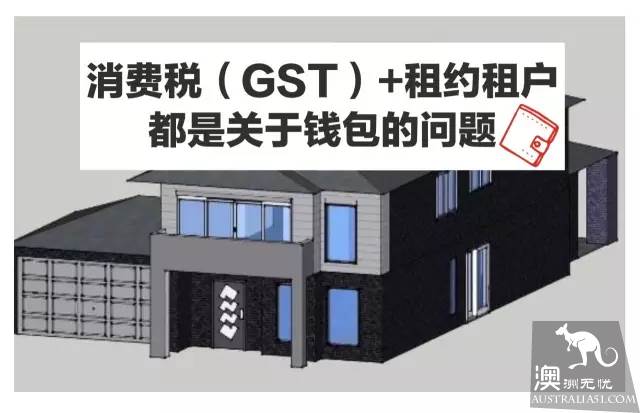In the last column we looked at some of the law issues we need to pay attention to when buying light-duty land: how to be a small developer in Australia? Today, we will highlight some of the issues that need to be noted if there are shops or commercial real estate on the purchased land.
Of course, the commercial real estate, here includes both purchases to continue to be used as rental investments as well as situations in which development is intended to be pushed down in the future. So as the middle part of small-scale development, we generalize together. However, due to the complexity and focus of general commercial real estate purchases, an article is far from clear, so this article focuses first on two points: the consumption tax (GST) and the tenancy issue.

On GST
The consumption tax (GST) is actually a very interesting topic. We know that the purchase of commercial real estate will involve the issue of GST. As a buyer, we see that we sometimes have to pay extra GST when the contract is closed and sometimes we don`t. Next, let me give an example to analyze the calculation and processing of GST.
Of course, even if the first need to pay GST, this GST is only temporarily paid out, in due course, as appropriate, can be returned. Only in the transaction will occupy a company`s cash flow reserves.
When the purchase price is very high, this GST will be an extra big expense. This does not, of course, mean that 10 percent of the total purchase price will be paid out for GST in all cases, but that will depend on the situation. If the buyer and seller do not calculate correctly on the GST issue, the transaction will also be a continuing problem for both parties.
Here I`m going to use a small commercial real estate deal that I used to buy and sell to tell you how GST is going to pay, under what circumstances, and how much is it going to pay?
This case covers most of what we can do and gets private ruling, from the Inland Revenue Department (ATO), so I`m going to simply share it with you here, of course, I`ll repackage the facts here.
To put it simply, the real estate is two-story buildings with a contract price of A $5 million. The specific situations are:
The first floor is two independent commercial stores (commercial premises), shop A as a coffee shop in operation, shop B is an idle shop unattended.
Shop A and B each have a well-equipped residential (residentialpremises), on the second floor.
Each shop and its upstairs residence is a property (title), two real estate two title, a sales contract.
Okay, how do I pay for such a real estate, GST?
We all know that a second-hand house, real estate, is usually input taxed supply.. In vernacular, buyers don`t have to pay extra GST or offset GST.. Of course, the brand-new residential real estate is another matter, here is not in-depth discussion.
As far as business real estate is concerned, one concept is that the GST-free supply of going concern, vernacular is that if a commercial real estate continues to operate before and after buying and selling, There is no extra payment for the GST (section 38 / 325 of the GST Act). When the commercial real estate is in the business.
Shop A is such a case. Of course, supply of going concern under the tax law also need to meet some additional requirements, not too much to elaborate here, you can consult accountants.
It`s an idle state like shop B, and when you buy and sell this kind of real estate, it`s an taxable supply, that requires an extra GST. payment.
Well, back to our example.
ATO will consider multiple factual factors when giving private ruling. So in this case, even if the entire second floor is vacant, because of its complete residential characteristics, including toilets, kitchens, bedrooms, etc., it is recognized as a residential part and does not require additional GST..
On the first floor, Shop A is GST-free due to a number of factors that prove that it is continuing to operate, including the lease agreement, and that the tenant will continue to be a tenant after land sale.
Shop B has been vacant and has not sought rental, so it needs to pay an extra GST.
Also, because in this example, although in fact real estate has only two property rights, (Title), it is split into four parts and sold together (one contract price). So shop B as a percentage of the extra payment for GST is another interesting point.
ATO concludes here that the ratio of shop B to the total house area is calculated as a proportion of the GST due. Assuming a total area of 500 square metres and shop B accounting for 125 square metres, it is calculated as follows:
125/500 * $5m =$1,250,000
$1250000 * 10% = $125000 (GST amount required)
As can be seen from this list, it is important to draw up an earlier land sale contract, because in deal, which is difficult to define by GST, it is necessary to ensure that the seller does not lose due to less receipt of GST, and that the buyer should not pay too much extra GST. in advance. So the contract should be careful and appropriate in dealing with GST.
If you need to apply for private ruling, you also have to deal with it in the contract. The ultimate goal is to deal with the GST correctly and accurately in order to avoid future disputes and troubles between the two sides.
At the same time, I suggest that accountants should be invited to buy a commercial real estate. In order to protect the best interests of guests from the point of view of the contract, we should start with the actual operation of the tax bureau or the time point of tax return, so as not to worry about the future.
About tenancy and tenant
If there is commercial activity on the land purchased, it will certainly involve existing leases and tenants. Unlike residential real estate transactions, most of the time they are sold in the form of empty houses. When commercial real estate is buying and selling, the existing tenant lease is a very important factor to measure the quality of real estate value. How to understand these leases and how to deal with them is also a big question.
If there is a written lease between all tenants and buyers, then no problem, buyer lawer reviews all leases. See if there are any adverse factors against the buyer in the terms.
From the point of view of development, whether there is a demolition clause in the lease is a detail that needs to be paid attention to; Whether to allow early notice to terminate the lease can clear all tenants immediately as soon as possible, or wait until all tenants` scheduled leases expire or give compensation, which are also factors to be considered in the presence of tenants.
The issue of retail tenants needs to be highlighted in particular. If the tenant and seller on the land have signed a law-compliant retail lease agreement, the buyer knows the details of the lease and continues to enforce it.
Be careful if there is no written lease between the tenant and the seller, only an oral agreement and a constant payment of the rent. Retail tenants generally have the concept of a five-year lease, what does that mean, according to the section 16 of the RetailLeases Act, retail lease is usually a minimum of five years, unless tenant lawer provides certificate, within six months of the beginning of the lease so that the lease can be less than five years. The lease here includes both black and white leases as well as oral leases.
So, if you go to buy a commercial real estate, and find that retail tenants and sellers only have verbal agreements, but always pay the rent, there will be some problems here.
First, although it is only an oral lease, because rent has been paid on a continuous basis, it will be default to the existence of a five-year lease. It cannot be assumed that the tenant can be evicted immediately after closing without a written lease, and that the land can be dismantled. Secondly, there will be a number of uncertainties in the absence of a written lease, including:
- Whether the tenant has been renting for more than 5 years;
- Has there ever been a written lease;
- It is not clear whether there are subleases or mortgage leases;
- Whether there is a dispute between the existing tenancy parties;
- Whether the original seller, the landlord has violated the oral lease of both parties;
- Does the tenant have rights to purchase real estate (option to purchase);
- If the lease has been more than 5 years, whether it is possible to terminate the lease at any time, how long notice to the tenant, etc.
Therefore, it is very important to understand the objective conditions of the existing tenancy tenants, whether it is to continue to operate as an investment after buying it, or to plan to push down the redevelopment and to understand the objective conditions of the existing tenancy tenants. It depends on whether the buyer`s business plan needs to be pushed down after a deal or if it will continue to be used as an investment lease for a short period of time.
In the next issue, we will focus on considerations for overseas buyers (including companies and funds) when buying commercially available real estate. Mainly from the perspective of FIRB analysis of what kind of business real estate overseas can buy, what can not buy, and specific requirements.

Article lawer: Xiao Yi
Registered lawer, Brightstone Legal partner, Supreme Court of New South Wales, University of Sydney Law School
Expertise in property law, commercial law and international investment, etc.

